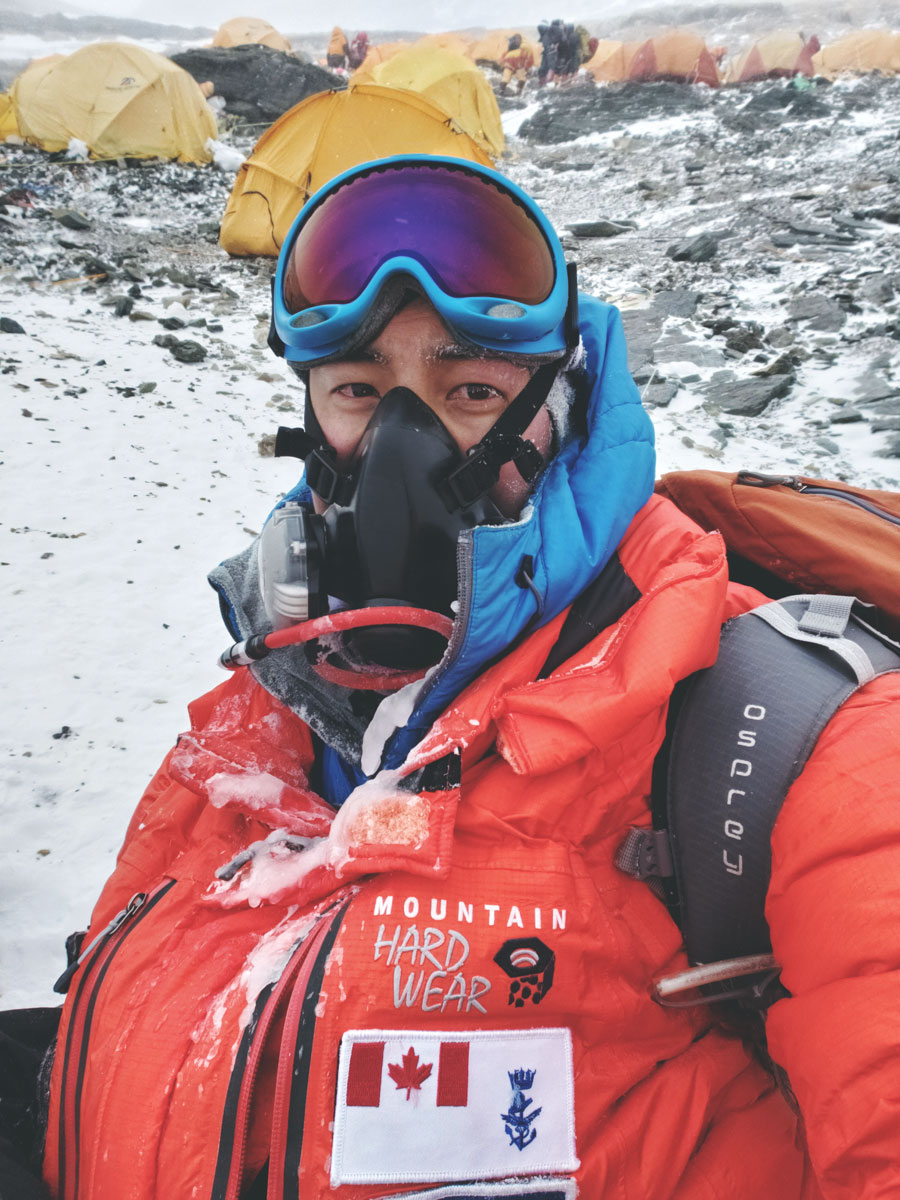Success and Summit Survival
By Lookout on Jun 03, 2019 with Comments 0

Captain Chris Dare, who works as a dentist at the Dockyard Dental Clinic, was part of the UK-based 360 Expeditions climbing team that scaled the world’s tallest mountain last week from its Tibetan side.
Peter Mallett, Staff Writer ~
A Canadian Armed Forces member says his military training was crucial to surviving a harrowing ascent to the summit of Mount Everest that turned deadly for one of his teammates.
Captain Chris Dare, who works as a dentist at the Dockyard Dental Clinic, was part of the UK-based 360 Expeditions climbing team that scaled the world’s tallest mountain last week from its Tibetan side. During a May 29 telephone interview from his hotel room in Tibet, Capt Dare said his experiences in the military made all the difference in getting him to the top of Everest and back to base camp alive.
“In the past, the military has put me in stressful situations, no sleep, exhaustion and getting fired upon in combat zones. I learned to calm down, to think and try to make the best decision possible instead of just going with my gut reaction.”
In his now viral Facebook post from Mount Everest Base Camp after the summit, Capt Dare didn’t celebrate conquering the 8,500-metre summit, which brought to fruition his goal to hike the world’s Seven Summits. Instead, the 35-year-old lamented on the death of Kevin Hynes, his beloved teammate. Hynes died in his sleep, in his tent during his descent down the mountain on May 24.
“Kevin was an amazing hard-working Irishman that I feel privileged to have met and spent so much time with,” wrote Capt Dare. “He always kept his mountaineering achievements under the radar and treated everyone with such kindness, it burns your heart. I miss him dearly.”
The death of the 56-year-old father and 10 other Everest climbers captured international headlines.
Capt Dare and Kevin Hynes were part of a seven-person, UK-based team of experienced mountaineers who made their ascent in treacherous wintry conditions. Over the six-week ascent Capt Dare says the team became like a family.
Capt Dare says Hynes wasn’t feeling well and decided to abandon his climb after getting 200 metres from camp 3, an elevation of 8300m. Hynes opted for safety and received a consoling pat on the back from Captain Dare as he descended the mountain. He died a few hours later, most likely from altitude sickness.
A DARING JOURNEY
His biggest safety concern prior to setting off on the expedition wasn’t the challenge of howling winds, snow, poor visibility and difficult terrain. It was becoming stuck behind slower groups of hikers and running out of oxygen in what is called the Death Zone, the last 848 metres of Everest.
That fear played out at the summit.
His expedition made the climb from Base Camp to Camp 1, located on the Tibetan side of the mountain where they waited for good conditions to climb the summit. On May 23, they got a break in the weather and set off to climb the final 1,800 metres of Everest. They were not the only ones scrambling to the top, and soon there was a backlog of climbers on the three vertical single lifts on the trail. Stiff winds, snow and -50 Celsius temperatures were just part of what they had to endure.
The endless string of climbers added hours to both the acscent and descent. Climbers gasped for air, going through their precious canisters of oxygen as the weather went from bad to worse. Capt Dare says what was to be a six to nine-hour journey from Camp 3 to the summit took more than 11.5 hours.
He abandoned the idea of snapping a selfie with Sherpa Nuru, spending less the 10 minutes at the top.
“I truly believed I was in danger of dying up there. I barely made it back, but a combination of my Nuru’s encouragement, thinking about friends and family at home, and repeating the words I’m not dying here today, I was able to stumble back into Camp 3.”
The danger for the rest of his teammates was omnipresent. Jamie Ironmonger was forced to make a tough decision and abort his climb a mere one hour from the summit due to oxygen supply concerns. Another teammate named Arthur and his guide Sherpa Pema ran out of oxygen at 8,600 metres. Capt Dare says the pair would have died if not for a Sherpa climber who gave them access to his cache of oxygen on the mountainside.
“Everyone on the team would like to know the identity of this miracle Sherpa so we can thank him.”
As he recuperated in his hotel room close to the Chinese border, he said the first thing he wants to do after the reunion with his family is get some good Canadian comfort food in the form of a big burger and large helping of French fries at A&W.
He said his Everest excursion will likely be his last high-altitude mountain climbing adventure.
“I have come to the realization that climbing these 8,000 metre peaks may not be worth the risk; there is too much danger involved. I am happy to have done the Seven Summits, but I am going to retire from climbing the extremely dangerous ones.”
Capt Dare wasn’t just making the journey for himself, his expedition was also a fundraiser on behalf of a BC Children’s Hospital called Summits of Hope, which at last count had raised over $10,000. www.summitsofhope.com/climbers/chris_dare
Filed Under: Top Stories
About the Author:





